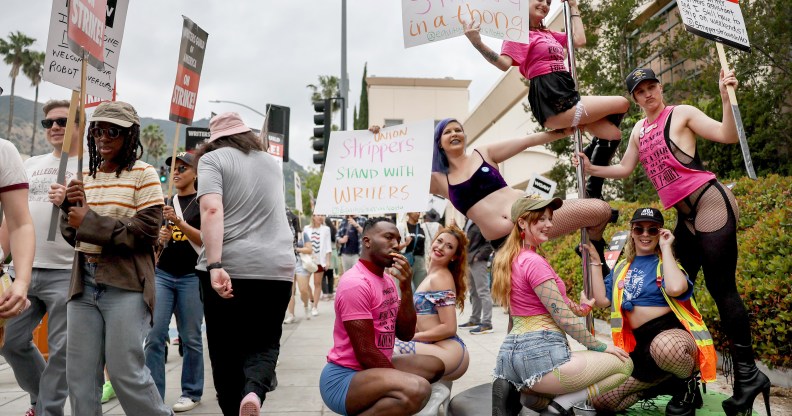Protestors rally for sex workers’ Bill of Rights which would end police raids on gay bars

Protestors gathered in Washington. (Stock image/Getty)
Protestors have rallied alongside sex workers at the Washington State Capitol in support of a bill which would improve conditions in adult venues, dubbed the “Strippers Bill of Rights”.
The “Strippers Bill of Rights”, Senate Bill 6105, would also prevent statewide lewd conduct regulations, which transpired in four LGBTQ+ clubs in Seattle being raided by local authorities.
Protestors, including adult dancers, gathered in Olympia, Washington, on 19 February to call for changes to the laws, as well as demand better working conditions in venues which host nude dancing.
The “Strippers’ Bill of Rights” would limit the fees strip clubs can charge dancers for performing, ban local ordinances which mandate the distance between dancers and customers, and require venues to provide security staff. The laws would also ensure mandatory training for performers to de-escalate conflicts with customers and prevent sex trafficking.
Earlier this month, authorities announced that charges would be dropped against the establishments with registered “lewd conduct violations”, while they also said they would pause enforcement of such regulations.
Local publication The Stranger claimed JET inspected 15 venues at the end of January, including four LGBTQ+ clubs, with “lewd conduct violations” registered. Other places included a college bar, a music venue and a bowling alley.
However, on 1 February, the LCB announced that it would drop the charges against those establishments. They also said they would pause enforcement of the “lewd conduct violations”, as per the outlet.
Gay majority floor leader Sen. Jamie Pedersen introduced an amendment to the bill which would repeal a section of the state code prohibiting “lewd conduct” in venues which serve alcohol.
Pedersen said on the Senate floor this month that he didn’t realise the regulations were still being enforced. He added that the raids on the LGBTQ+ bars felt like something “from a different era”, as per the Washington State Standard.
“I was quite surprised and didn’t realize until a week and a half ago that the regulation that is the subject of this amendment was still in force. As far as we can tell, the language of it dates back more than 50 years to an era that I think many of us assumed we had left behind,” he said.

